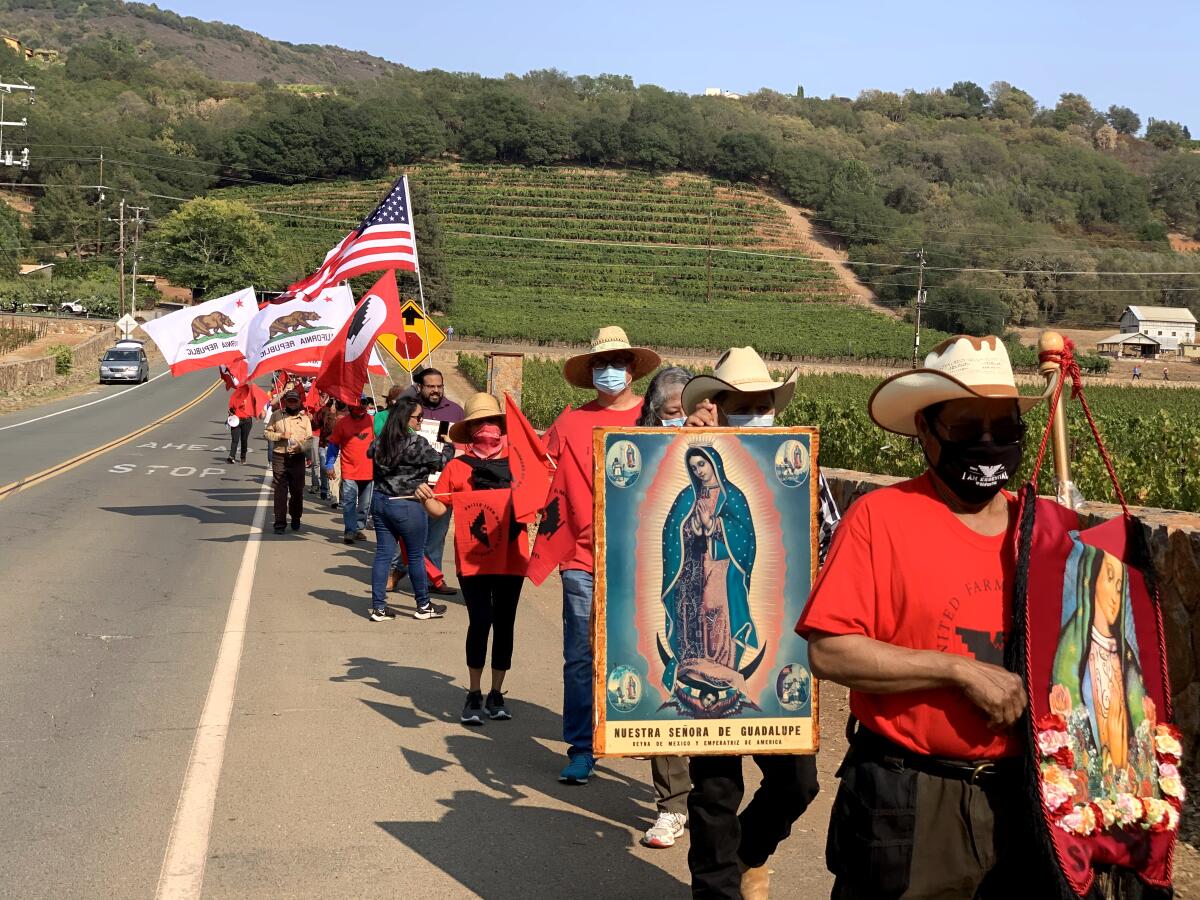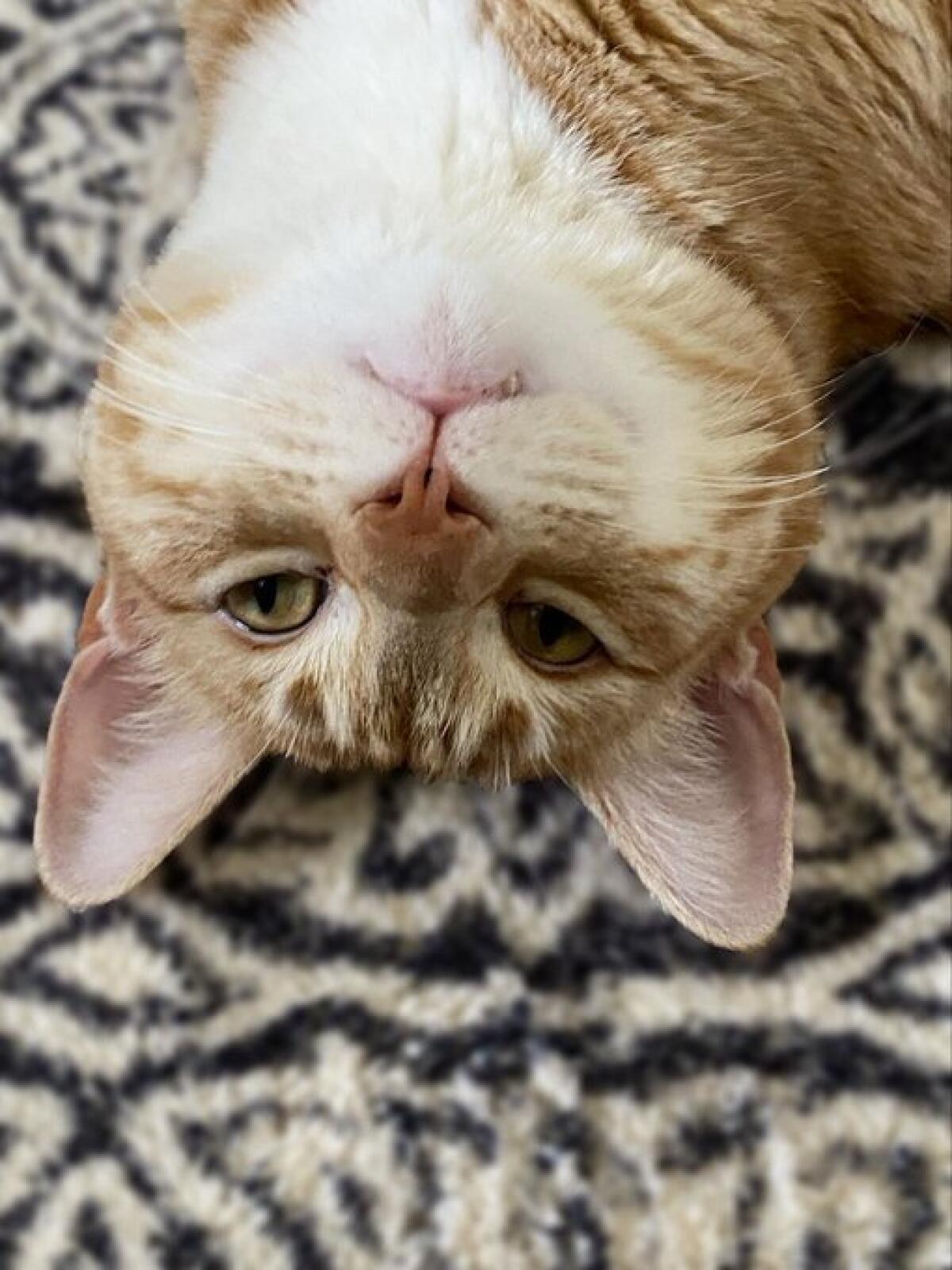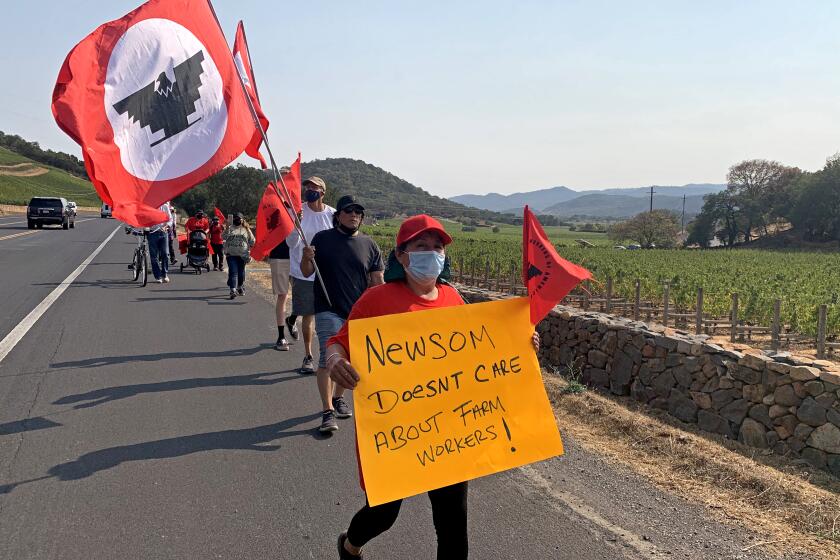Column: Newsom didn’t meet with farmworkers on César Chávez Day. One internet cat is irate

SACRAMENTO — Thursday was César Chávez Day, and farmworkers want to know why Gov. Gavin Newsom didn’t meet with them, as they requested, if only for the symbolic unity of standing alongside some of the state’s most essential and vulnerable laborers to celebrate the birthday of their beloved icon.
Quick answer: Newsom headed to Central and South America on a family vacation yesterday.
Longer answer: For months, the governor has been on the outs with the United Farm Workers union over his unexpected veto of a bill last year that would have allowed mail-in ballots for farmworker union elections.
After the governor failed to put his signature on that UFW legislation last fall, union members marched in protest from the French Laundry, the uber-expensive restaurant where Newsom was caught dining during the pandemic, to PlumpJack Winery, which Newsom co-founded — pummeling him on the aura of eliteness that has long been his Achilles’ heel.
My colleague Jean Guerrero was there, and wrote at the time that “Newsom had a moral duty, given how essential these workers are, to collaborate with the United Farm Workers to ensure the bill’s success.”
Couldn’t have said it better.
But since the burst of attention that march caused, there has been no reconciliation with the governor. Farmworkers have since been waging a lonely battle — with the exception of one unlikely ally.
Jorts the Cat.
Jorts is an internet feline, fluffy and orange, who really, really loves organized labor. And trash cans, which he falls into on a regular basis. And his sister Jean, who tries to stay off social media.
But Jorts does not like Newsom, or his treatment of farmworkers.

“I think he founded a winery. I think he is a boss,” Jorts told me in a direct message on Twitter (the human behind the account remains anonymous). “When it matters, he did not side with the workers who pick the grapes who build wealth that pays for his haircuts.”
Jorts likes to make fun of Newsom’s hair.
Jorts’ notoriety soared after a Reddit thread about him went viral late last year, in which his anonymous human detailed a dispute with another human co-worker, Pam, about whether Jorts was just too dumb to learn new skills. From there, Jorts hit Twitter and began a meteoric rise as one of the pre-eminent labor voices on social media (only slightly kidding).
He’s amassed nearly 170,000 followers, including the AFL-CIO, its president, Liz Shuler, and new California labor leader Lorena Gonzalez. He has more followers than both of them combined.
Like Devin Nunes’ cow, Jorts has clout.
I’m no fan of the far right, but they do have political lessons to teach us. One is that there’s a whole new world of politics run by memes — bovines, frogs and maybe even cats. Where traditional ways of raising a ruckus are harder to come by in an environment cluttered with pandemic and war, one viral post can sway opinion.
An internet cat may seem like a gimmick or a side note in a serious legislative fight, but Chávez said it best: “Somehow, the guys in power have to be reached by counterpower, or through a change in their hearts and minds, or change will not come.”
Jorts is counterpower for UFW, which needs all the help it can get. And internet cats are really good at grabbing hearts and minds because they tend to keep things simple and cute, even if they’re not.
Like many political intrigues, the situation between Newsom and farmworkers is complicated. Newsom and the union disagree on whether his office was willing to work on the bill he vetoed last year. Those involved say the union wasn’t willing to compromise, while others say the compromises on the table would have gutted the proposed law. Not in dispute is that since that veto, UFW and the governor have not spoken directly, despite requests from the union to meet.
Newsom vetoed a bill that would have let farmworkers vote by mail in union elections. The farmworkers who helped him survive the recall feel betrayed.
Assemblymember Mark Stone of Monterey Bay reintroduced a nearly-identical measure this year, and told me yesterday he’s feeling optimistic he can get his bill signed this time, adding that the governor’s staff has been “very gracious and open to working with us.”
UFW isn’t taking chances, and plans on a hard public push to make known its displeasure with Newsom. Thursday, union members held events in 13 cities, including at the Capitol, pounding on the fact that Newsom isn’t with them on this important day.
A Newsom spokesman said he’d promised his kids the time off after “the last two years of having vacations deferred by the pandemic, fires and the recall.” In a letter to the union on March 28, his staff wrote that he “looks forward to meeting with UFW leadership in the near future.”
That all may sound like typical political theater, if it wasn’t for the very precarious position of farmworkers in California right now.
The UFW has long been losing members for decades and has only about 7,000 on its rosters, Philip Martin, a farm labor expert at UC Davis, told me. California has about 400,000 farmworkers.
There are multiple reasons for that decline, debated at length. Some argue that, though brilliant at organizing, Chávez lacked the ability to lead the union once it was formed, and it’s never recovered. Others point to Republican governors such as George Deukmejian for being too friendly with growers, decimating organizing protections over time.
There’s also the fact that the large companies that Chávez first targeted have mostly ceased to exist. Maybe most profoundly, California agriculture has adopted a new system of labor in which third-party “labor contractors” act as middlemen between growers and farmworkers, making it more difficult to unionize a particular owner.
Farmworkers live a fragile existence, many undocumented — often staying in company or state-owned housing, dependent on an employer for transportation, scared to show up on a boss’ property to vote in a union election. For the past few years, the pandemic has hit them harder than others, since they often lack workplace protections and access to vaccines, and are vulnerable to evictions and homelessness, despite state efforts at equity.
This legislation, they argue, could help them begin a slow rebuild by taking elections off owners’ land and putting them in mailboxes, providing a pathway to better working conditions that have continued to elude them despite years of fighting.
Maria Garcia, a farm laborer who works four months a year at a union job pruning roses and the rest of her time at a non-union site, said she often sees her co-workers stay silent about abuse because they fear retaliation. She feels betrayed by the governor’s veto.
“We put food on the table, even the governor’s,” she said. If she did get to meet with him, she’d ask why he vetoed a bill that she believes “would have protected us.”
Faced with declining numbers, UFW has become more focused on state politics, as opposed to local organizing. The Legislature is more Latino than ever, with multiple members having immigrant and even farmworker families. But UFW’s power is based more on goodwill and history than actual heft. It doesn’t have deep pockets, and increasingly, farmworkers struggle to capture public attention for fights like this one over complicated union rules.
At the same time, Newsom’s political power has skyrocketed. After fighting off the recall (where UFW knocked on doors for him), he’s become virtually untouchable. His public approval ratings are high, and he has no significant challenger for another term in office. That has left some, even in his own party, grumbling that he has little need to compromise with anyone, let alone a union that has attacked him personally.
Which bring us back to Jorts the Cat.
When Jorts sent a direct message to the union about a question he’d received from a follower, UFW was quick to write back. Elizabeth Strater, UFW’s director of strategic campaigns, said she’s been direct messaging with Jorts for a few months. She loves his “joyful chaos” and the amplification of their message, but concedes it’s hard working with a cat.
“Nobody can tell a cat what to do,” she said. “As much as I absolutely love him photoshopping his face on Gavin Newsom’s body, that’s not on message.”
It may not be the dignified communication the union normally embraces, but it is effective. By 8 a.m. on César Chávez Day, Jorts had already sent out multiple requests to support farmworkers, and added another hair tweak for a governor who has few open critics within his own party. Because, as Jorts and I agree, every politician needs criticism, especially the ones powerful enough to ignore it.
“You may notice I don’t really spend a lot of time talking about bonkers Republicans,” Jorts told me Wednesday night. “I spend more time talking about people who should be accountable to workers.”
More to Read
Sign up for Essential California
The most important California stories and recommendations in your inbox every morning.
You may occasionally receive promotional content from the Los Angeles Times.












